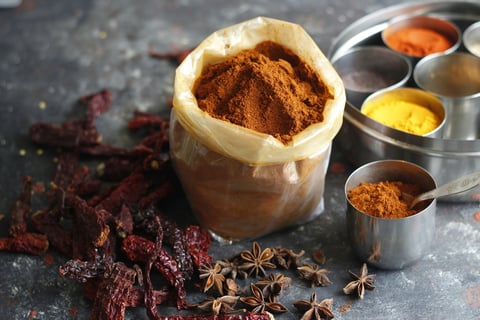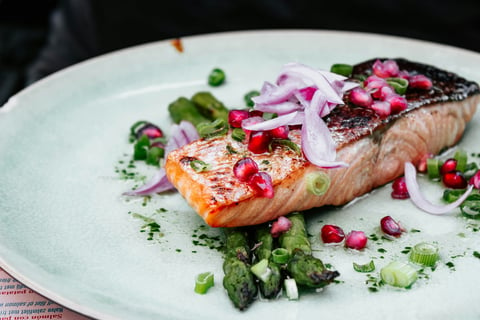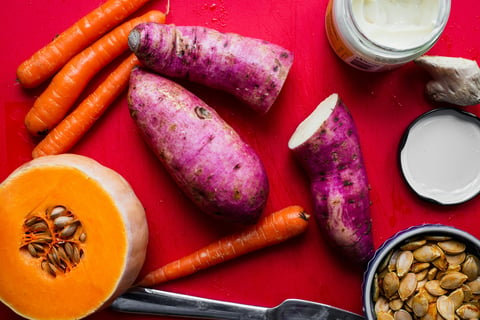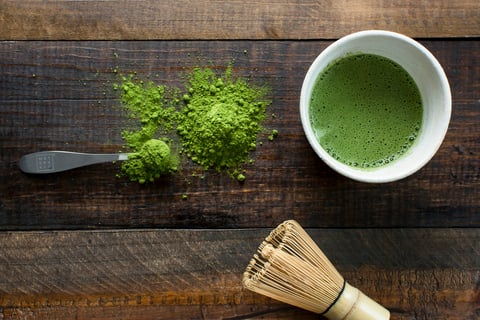Superfoods for Busy Professionals: Part 2 – The Next 5 Energy & Immunity Boosters
This second part covers five more superfoods, each packed with essential nutrients that enhance brain function, reduce inflammation, improve circulation, and provide lasting energy. From turmeric’s anti-inflammatory power to green tea’s focus-enhancing benefits, these superfoods will elevate your daily nutrition and performance.
DIET & NUTRITION
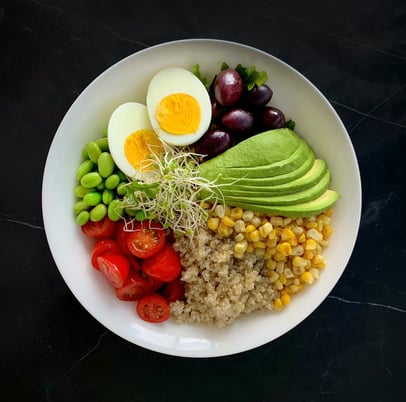

Superfoods for Busy Professionals: Part 2 – The Next 5 Energy & Immunity Boosters
The Busy Professional’s Guide to Better Energy & Immunity
In Part 1 of this series, we explored five powerful superfoods—blueberries, spinach, almonds, Greek yogurt, and chia seeds—that help busy professionals stay energized, focused, and resilient throughout the day. But we’re not done yet!
This second part covers five more superfoods, each packed with essential nutrients that enhance brain function, reduce inflammation, improve circulation, and provide lasting energy. From turmeric’s anti-inflammatory power to green tea’s focus-enhancing benefits, these superfoods will elevate your daily nutrition and performance.
Let’s dive into the next five superfoods that can supercharge your energy, immunity, and cognitive function!
1. Turmeric – The Anti-Inflammatory Powerhouse
History & Background
Turmeric has been a staple in Indian and Chinese medicine for over 4,000 years, used for its healing and anti-inflammatory properties. It was traditionally incorporated into Ayurvedic and traditional Chinese medicine to treat various ailments, from digestive issues to joint pain and infections.
The active compound in turmeric, curcumin, has gained global recognition in modern science for its potent anti-inflammatory and immune-boosting effects. Today, turmeric is widely used in golden milk, herbal teas, and supplements for its health benefits.
Why It Works
Turmeric’s curcumin content helps reduce inflammation, which is a major cause of fatigue, joint pain, and immune system weakness. Chronic inflammation can lead to brain fog, sluggishness, and an increased risk of illness, making turmeric an essential food for professionals looking to stay sharp and productive.
Curcumin also supports brain function by boosting brain-derived neurotrophic factor (BDNF), a protein that helps with memory, learning, and stress adaptation. Additionally, turmeric has antioxidant properties that protect the body from oxidative stress, further strengthening the immune system.
Interesting Trivia
Turmeric was once so highly valued that ancient traders referred to it as "Indian gold", using it as a currency for trade in some regions.
How to Add It to Your Routine
Morning boost: Stir turmeric into coffee, tea, or warm milk (golden milk).
Cooking essential: Add turmeric to soups, curries, and rice dishes.
Supplement option: Take curcumin capsules for a concentrated dose.
🔗 Scientific Backing: Curcumin enhances immune response and fights inflammation. PubMed
2. Dark Chocolate – The Smart Indulgence
History & Background
Dark chocolate comes from cacao beans, which were first cultivated by the Mayan and Aztec civilizations over 3,000 years ago. The Aztecs even used cacao as currency and believed it had magical, energizing properties.
Originally consumed as a bitter drink mixed with spices, cacao was later introduced to Europe in the 16th century, where it was sweetened and transformed into the chocolate we know today. However, only dark chocolate retains the original health benefits of cacao.
Why It Works
Dark chocolate is rich in flavonoids, plant-based compounds that help improve blood circulation, enhance cognitive function, and reduce stress. Flavonoids boost nitric oxide production, which relaxes blood vessels, allowing more oxygen and nutrients to reach the brain—perfect for professionals looking to enhance focus and mental clarity.
Dark chocolate also contains magnesium, which helps reduce stress levels and supports muscle relaxation and nerve function. Additionally, it triggers the release of endorphins and serotonin, promoting feelings of calmness and well-being—an ideal pick-me-up for stressful workdays.
Interesting Trivia
The scientific name for the cacao tree is Theobroma cacao, which literally means “food of the gods.”
How to Add It to Your Routine
Mid-day energy boost: Enjoy a small piece of 70%+ dark chocolate as an afternoon snack.
Smoothie ingredient: Blend unsweetened cocoa powder into protein shakes.
Healthy dessert: Melt dark chocolate and drizzle over fruit or mix into oatmeal.
🔗 Scientific Backing: Flavonoids in dark chocolate enhance focus and blood flow. Medical News Today
3. Salmon – The Productivity Protein
History & Background
Salmon has been consumed for thousands of years, especially by Indigenous tribes of North America, Scandinavia, and Japan, who relied on it for its nutritional density and energy-sustaining benefits.
This fatty fish remains a staple in heart-healthy diets, providing omega-3 fatty acids, protein, and essential vitamins that contribute to long-term well-being and brain function.
Why It Works
Salmon is one of the best sources of omega-3 fatty acids, which play a crucial role in reducing inflammation, supporting brain health, and improving mood. Omega-3s enhance blood circulation to the brain, helping professionals stay sharp, focused, and mentally alert throughout long workdays.
Additionally, salmon provides high-quality protein, which supports muscle recovery and energy production, making it ideal for maintaining stamina and resilience.
Interesting Trivia
Wild salmon get their pink-orange color from their diet, which includes krill and shrimp—foods rich in astaxanthin, a powerful antioxidant.
How to Add It to Your Routine
Power lunch: Grill or bake salmon and pair it with veggies.
Breakfast boost: Add smoked salmon to toast or an omelet.
Meal prep essential: Include salmon in weekly meal plans for sustained energy.
🔗 Scientific Backing: Omega-3s in salmon improve brain function and energy. Harvard T.H. Chan School of Public Health
4. Green Tea – The Focus Enhancer
History & Background
Green tea has been consumed for over 4,000 years, originating in ancient China before spreading to Japan, Korea, and beyond. According to legend, Emperor Shen Nong accidentally discovered green tea when tea leaves blew into his boiling water around 2737 BCE. Recognizing its refreshing and medicinal properties, green tea quickly became an integral part of Chinese medicine, spiritual rituals, and daily life.
By the 12th century, Zen Buddhist monks in Japan refined the practice of drinking green tea, using it to enhance meditation and mental clarity. Today, green tea remains one of the most widely consumed beverages in the world, valued for its ability to boost focus, reduce stress, and strengthen immunity.
Why It Works
Green tea is a natural cognitive enhancer, containing a unique combination of caffeine and L-theanine that provides a calm, sustained energy boost without the jitters associated with coffee. Caffeine in green tea stimulates brain function, improving alertness, reaction time, and concentration, while L-theanine promotes relaxation and reduces stress by increasing alpha brain wave activity. This results in a focused, yet calm state of mind, making green tea an excellent choice for professionals who need to stay sharp without feeling overstimulated.
Additionally, green tea is rich in catechins, a type of antioxidant that helps reduce oxidative stress in the brain, potentially lowering the risk of cognitive decline and mental fatigue. Epigallocatechin gallate (EGCG), the most potent catechin in green tea, has been shown to enhance memory, support neuron growth, and protect brain cells from damage.
Beyond cognitive benefits, green tea also helps boost metabolism and fat oxidation, providing a steady source of energy throughout the day. Unlike energy drinks or coffee, which can lead to caffeine crashes, green tea promotes a more balanced, long-lasting energy effect, making it a great alternative for those looking to improve focus without experiencing burnout.
Interesting Trivia
In traditional Japanese tea ceremonies, preparing and drinking matcha (powdered green tea) is considered an art form that emphasizes harmony, respect, and mindfulness—further reinforcing its connection to mental clarity and well-being.
How to Add It to Your Routine
Morning alternative: Swap coffee for green tea to start the day with calm focus.
Pre-work focus booster: Drink a cup before important meetings or deep work sessions.
Matcha upgrade: Try matcha (powdered green tea) for a higher concentration of antioxidants and L-theanine.
🔗 Scientific Backing: Catechins in green tea improve focus and reduce fatigue. National Library of Medicine
5. Sweet Potatoes – The Stamina Booster
History & Background
Sweet potatoes have been cultivated for over 5,000 years, originating in Central and South America before spreading across the world. Indigenous civilizations such as the Incas and Mayans relied on sweet potatoes as a staple food due to their long shelf life, nutrient density, and ability to provide sustained energy.
By the 16th century, European explorers, including Christopher Columbus, introduced sweet potatoes to Asia and Africa, where they quickly became an essential crop. Today, they remain a dietary cornerstone in many cultures, from Japanese satsumaimo to Caribbean sweet potato stews.
Why It Works
Sweet potatoes are a rich source of complex carbohydrates, which provide long-lasting energy without the spikes and crashes associated with refined sugars. Unlike processed carbs, the slow-digesting fiber in sweet potatoes gradually releases glucose into the bloodstream, ensuring steady stamina throughout the day. This makes them an excellent choice for professionals who need sustained energy levels without feeling sluggish.
In addition to being a natural energy booster, sweet potatoes are packed with beta-carotene, a powerful antioxidant that the body converts into vitamin A. This nutrient plays a key role in immune function, helping the body fight infections and reduce inflammation, keeping professionals healthy and resilient even during stressful periods.
Sweet potatoes are also a great source of potassium, which helps regulate fluid balance, nerve function, and muscle contractions. Adequate potassium intake can help prevent dehydration, reduce muscle fatigue, and support overall endurance—especially useful for those who spend long hours at a desk or frequently experience energy dips in the afternoon.
Interesting Trivia
In Japan, sweet potatoes (known as satsumaimo) are often sold as hot, roasted street food in the winter. Many believe that consuming them regularly leads to longevity, as Okinawa, home to some of the world’s oldest living people, has a diet heavily based on sweet potatoes!
How to Add It to Your Routine
Power breakfast: Roast sweet potatoes and top with nut butter or yogurt.
Energy-boosting lunch: Use mashed sweet potatoes as a side dish or add them to salads.
Snack option: Bake homemade sweet potato fries for a healthy afternoon energy boost.
🔗 Scientific Backing: Beta-carotene in sweet potatoes enhances immune function. WebMD
Conclusion
In Part 2 of our Superfoods for Busy Professionals series, we explored five more powerful foods that can boost focus, immunity, and energy levels. Turmeric reduces inflammation and supports brain function, dark chocolate enhances concentration and reduces stress, salmon fuels productivity with omega-3s, green tea sharpens mental clarity, and sweet potatoes provide long-lasting stamina.
By adding these superfoods to your daily diet, you can combat fatigue, stay mentally sharp, and maintain peak performance—without relying on caffeine and processed snacks.
Which of these five superfoods will you be adding to your routine? Let us know! 🚀
